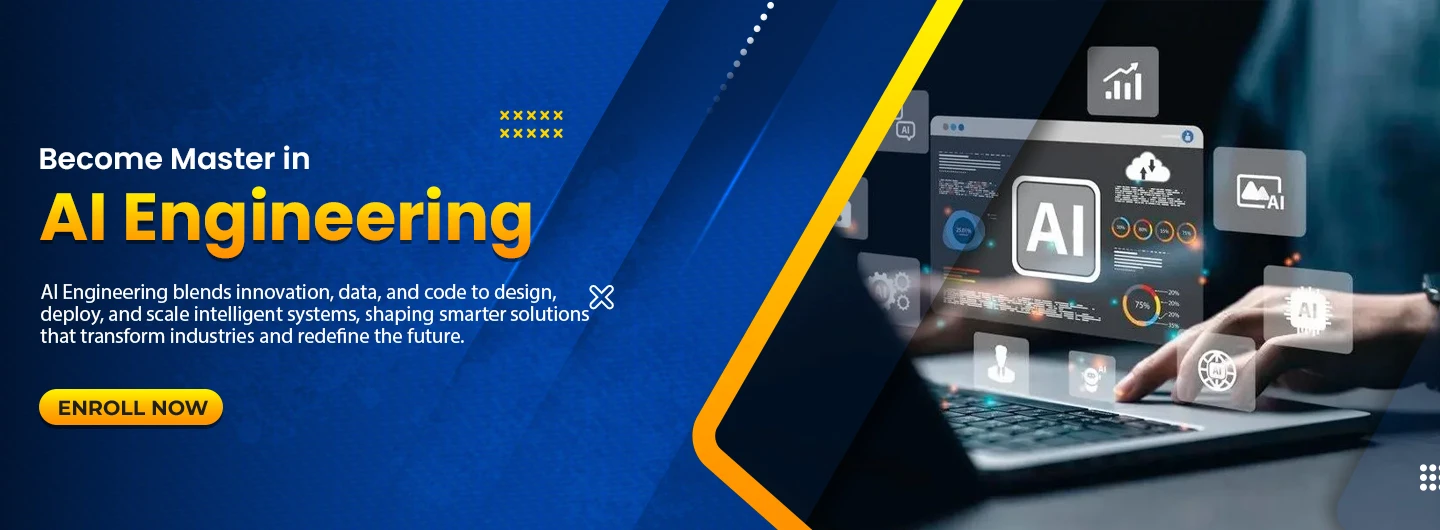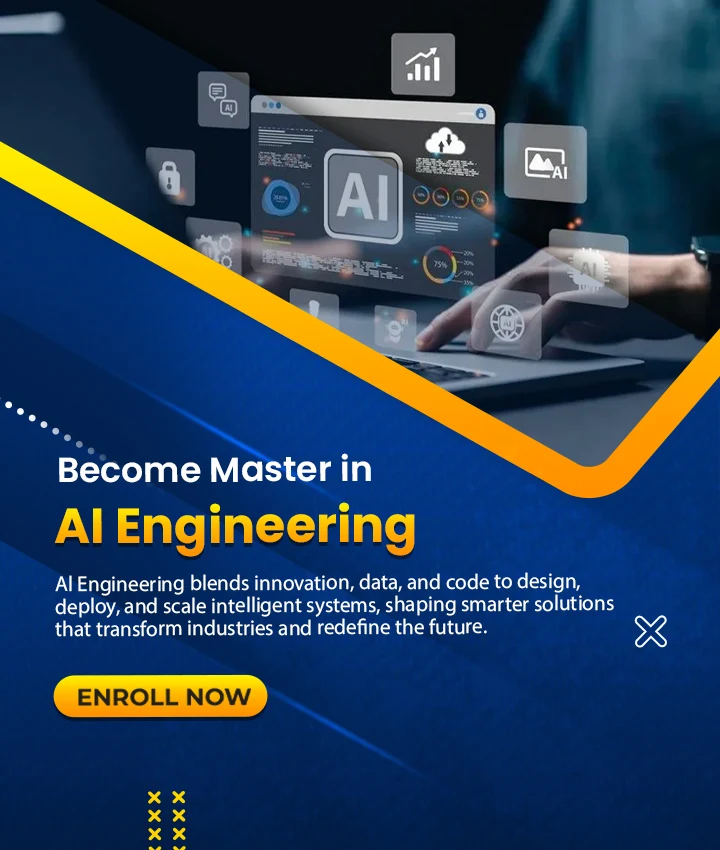


Artificial intelligence is the new thing turning the industries and skilled AI workers are becoming highly demanded. IFDA offers industry-focused AI engineering courses that prepare students for high-demand careers. It includes machine learning, natural language processing, computer vision, robots and AI ethics in an academic program that combines theory with applied training. Whether you attend our offline AI engineering courses in Delhi or enroll in an online AI engineering course near me, you’ll gain real-world skills that employers value. IFDA Institute is recognized for offering top AI courses in Delhi and is a leading AI institute in Delhi. By joining an AI course in Delhi with IFDA, students can gain practical knowledge and career-ready skills in the fast-growing field of Artificial Intelligence
Course Highlights
1. |
Zero-to-production pathway |
2. |
Latest, industry-relevant stack and practices with real projects and a capstone. |
3. |
Efficient fine-tuning (PEFT/LoRA/QLoRA) and quantization for cost-effective deployment. |
4. |
High-throughput model serving (ONNX Runtime, NVIDIA Triton, vLLM) with simple APIs. |
5. |
Governance-ready workflows: documentation, basic privacy controls, and safety guardrails. |
6. |
Quality-by-design: experiment tracking, evaluation, drift monitoring, data-quality checks, and explainability. |
7. |
5 Assignments |
8. |
240 Hours Of Training |
9. |
1 Year Free Backup Classes |


Learning Outcome
| • | Learn the concepts and practice of AI |
| • | Create and implement machine learning models |
| • | NLP, image recognition, and predictive analytics work | Read More |
| • | Learn to use master tools, such as Python, TensorFlow and PyTorch |
| • | Get hands-on-experience in projects |
| • | Prepare to work in the field of AI engineering, data science and automation | Read Less |
Software that you will learn in this course




Course Content
| 1. Tool Setup |
| • Topics: CLI, VS Code, Git/GitHub, Python, Colab/Jupyter |
| • Lab: Setup repo, env, notebook |
| • Deliverable: "Hello, Data" repo + README |
| 2.Python + NumPy/Pandas |
| • Topics: Python basics, functions, arrays, DataFrames, I/O |
| • Lab: Clean CSV, basic stats |
| • Deliverable: Data wrangling notebook |
| 1. EDA + Viz |
| • Topics: Plots, outliers, correlation, data stories |
| • Lab: EDA report |
| • Deliverable: EDA notebook |
| 2. ML Math |
| • Topics: Stats, probability, gradients, loss |
| • Lab: Manual metrics, gradient step |
| • Deliverable: Math worksheet |
| 3. Data Prep |
| • Topics: Split, leakage, scaling, encoding, CV |
| • Lab: Sklearn pipeline |
| • Deliverable: Reusable pipeline |
| 4. Supervised I |
| • Topics: Linear/logistic, metrics (R², AUC, F1) |
| • Lab: House price regression |
| • Deliverable: Model table |
| 5. Supervised II |
| • Topics: Trees, RF, GB, feature importance |
| • Lab: Churn classifier |
| • Deliverable: Tuned model + report |
| 6. Unsupervised + Tracking |
| • Topics: K-Means, PCA, MLflow |
| • Lab: PCA + MLflow |
| • Deliverable: Logged runs |
| 1. Prompting |
| • Topics: Prompts, JSON, tools/functions |
| • Lab: Structured answers |
| • Deliverable: Prompt kit |
| 2. Embeddings |
| • Topics: Chunking, metadata, search, filters |
| • Lab: Index PDFs |
| • Deliverable: Vector index + queries |
| 3. RAG |
| • Topics: Retriever-generator, context, grounding |
| • Lab: RAG bot |
| • Deliverable: QA over docs |
| 4. RAG Eval |
| • Topics: Precision, rerank, hallucination |
| • Lab: Eval set + rerank |
| • Deliverable: Eval charts |
| 5. Agents |
| • Topics: Tools, planning, retries |
| • Lab: Tool agent |
| • Deliverable: Agent diagram + code |
| 6. Fine-tuning |
| • Topics: LoRA, QLoRA, 4-bit, tune vs retrieve |
| • Lab: QLoRA run |
| • Deliverable: Adapter + eval |
| 7. Ship App |
| • Topics: UX, limits, cost, logs |
| • Lab: Wrap RAG/agent |
| • Deliverable: Working app |
| 1. PyTorch |
| • Topics: Tensors, autograd, modules, opt |
| • Lab: Train MLP |
| • Deliverable: Loop template |
| 2. Training Tips |
| • Topics: Reg, LR, early stop |
| • Lab: Overfit → fix |
| • Deliverable: Training script |
| 3. CNNs |
| • Topics: Conv, pool, aug, vision metrics |
| • Lab: Fashion-MNIST |
| • Deliverable: Model + eval |
| 4. Transfer Learning |
| • Topics: Freeze, tune, checkpoints |
| • Lab: Pretrained CNN |
| • Deliverable: Model + README |
| 5. Transformers |
| • Topics: Tokens, emb, attn, encoder/decoder |
| • Lab: Sentiment model |
| • Deliverable: Notebook |
| 6. NLP Tasks |
| • Topics: Batching, masking, eval |
| • Lab: NER/text class |
| • Deliverable: Metrics dashboard |
| 7. Debug + AMP |
| • Topics: Speed, AMP, seeds, errors |
| • Lab: Speed vs acc |
| • Deliverable: Checklist + results |
| 1. API + Docker |
| • Topics: FastAPI, Docker, CI/CD |
| • Lab: Serve model |
| • Deliverable: Dockerized API |
| 2. ONNX |
| • Topics: Convert, latency, CPU/GPU |
| • Lab: ONNX vs native |
| • Deliverable: Bench report |
| 3. LLM Serving |
| • Topics: Triton, vLLM, batching |
| • Lab: Load test |
| • Deliverable: Load results |
| 4. Monitor + Drift |
| • Topics: MLflow, drift, quality tools |
| • Lab: Add checks |
| • Deliverable: Monitor guide |
| 1. Safety |
| • Topics: Privacy, filters, runbooks |
| • Lab: Add guardrails |
| • Deliverable: Safety list |
| 2. Explainability |
| • Topics: SHAP/LIME, model cards |
| • Lab: Explain + doc |
| • Deliverable: Report |
| 1. Scope |
| • Topics: Problem, KPIs, sketch |
| • Deliverable: Plan |
| 2. MVP |
| • Topics: First build |
| • Deliverable: MVP demo. |
| 3. Improve |
| • Topics: Perf, monitor, fix bugs |
| • Deliverable: Perf report |
| 4. Deploy |
| • Topics: Final deploy, README, demo |
| • Deliverable: Live demo + repo. |
Jobs and Career Opportunity After Completing Course
After completing this course you will get many job and career opportunities easily in the computer and IT field like e-commerce, government organizations, and security companies. You can start your early earnings with this course because there is no education criteria for this course and every business needs that kind of skilled employee. IFDA Institute is known for offering the best AI courses in Delhi. As a leading AI institute in Delhi, it provides practical learning, and enrolling in an AI course in Delhi will help you gain job-ready skills for a successful career.
| Job profile After completing this course |
Average salary ( 1+ year experience) |
|---|---|
| AI/ML Engineer | ₹3.6 L |
| Machine Learning Engineer | ₹10–12 |
| Data Scientist / Applied Scientist | ₹12–15 L |
| NLP / LLM Engineer | ₹10–20 L |
| MLOps / Model Deployment Engineer | ₹10–15 L |
| AI Product Engineer | ₹8–15 L |
| Data Analyst (Python/SQL) | ₹4–8 L (entry-level) |

Backup Class

Flexible Timing

Fees Installment

Expert Trainer

100% job assistance

Free Library
.webp)
Live Project
.webp)
Practical learning

I recently joined the AI Engineering course at IFDA Institute, Kalkaji, and I’m really happy with my decision. The institute balances theory and practical sessions very well, and the smart classes make it easy to understand complex concepts. The course is worth the fees, and I feel it’s one of the best options for anyone looking for AI Engineering courses in Delhi.

My experience at IFDA Institute has been excellent. The faculty is supportive, and the modules are explained in a practical way. I was searching for an AI Engineering course near me, and I’m glad I chose IFDA. The AI Engineering course fees are affordable compared to the quality of training, and the smart classrooms make learning more engaging.

IFDA Institute is a great choice for students interested in AI Engineering courses. The syllabus is well-structured, covering both theoretical knowledge and practical applications. The trainers are very helpful, and the fees are reasonable for the value provided. For anyone planning to start their career in AI, this institute offers one of the most reliable AI Engineering courses in Delhi.

0k +

0k +

0+
.webp)
0+
Frequently Asked Questions
IFDA Institute offers one of the leading AI Engineering courses in Delhi with a strong focus on practical learning. Students get access to expert faculty, smart classrooms, and real-world projects. The course is structured to cover Python, machine learning, and AI concepts, helping students gain the knowledge and confidence to build a successful career.
The AI Engineering course fees at IFDA Institute are affordable compared to the quality of training provided. The institute ensures value for money by offering a well-structured syllabus, practical exposure, and smart class learning. Students not only understand the concepts but also learn industry-level skills, making the fee investment highly worthwhile for long-term career growth.
IFDA Institute provides industry-focused AI Engineering courses that blend theoretical knowledge with practical applications. The experienced faculty ensures each student learns through real-world projects and hands-on training. With smart classroom facilities and supportive mentors, students gain a strong foundation in artificial intelligence, making IFDA one of the best institutes for future-ready AI professionals.
.png)
 (1).png)
 (1).png)
 (1).png)
 (1).png)
 (1).png)


Get free counselling by our experience counsellors. We offer you free demo & trial classes to evaluate your eligibilty for the course.
Have you
Any question
Or need some help?
Please fill out the form below with your enquiry, and we will respond you as soon as possible.